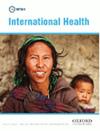天空是极限:提高卫星图像数据素养,以应对非传染性疾病。
IF 2.2
4区 医学
Q2 PUBLIC, ENVIRONMENTAL & OCCUPATIONAL HEALTH
引用次数: 0
摘要
低收入和中等收入国家占全球非传染性疾病导致的过早死亡的77%,而这些国家的基本健康决定因素数据往往稀缺且不准确。提高全世界的卫星图像数据素养是利用通过卫星收集的大量公开数据的一个不可或缺的步骤,这些数据包括空气污染、绿地和夜间灯光等——所有这些都是非传染性疾病的决定因素。现有的基于机器学习的算法可以自动分析卫星图像数据,但卫生官员和科学家必须知道在哪里找到这些算法,以及如何应用这些算法来衡量风险和目标干预措施。本文章由计算机程序翻译,如有差异,请以英文原文为准。
The sky's the limit: improving satellite imagery data literacy to address non-communicable diseases.
Low-and middle-income countries experience 77% of the world's premature deaths caused by non-communicable diseases, and their underlying health determinant data are often scarce and inaccurate. Improving satellite imagery data literacy worldwide is an integral step toward using the vast amount of publicly available data collected via satellites, such as air pollution, green space and light at night-all determinants of non-communicable diseases. Existing machine learning-based algorithms enable automated analysis of satellite imagery data, but health officials and scientists must know where to find and how to apply these algorithms to measure risk and target interventions.
求助全文
通过发布文献求助,成功后即可免费获取论文全文。
去求助
来源期刊

International Health
PUBLIC, ENVIRONMENTAL & OCCUPATIONAL HEALTH-
CiteScore
4.50
自引率
0.00%
发文量
83
审稿时长
>12 weeks
期刊介绍:
International Health is an official journal of the Royal Society of Tropical Medicine and Hygiene. It publishes original, peer-reviewed articles and reviews on all aspects of global health including the social and economic aspects of communicable and non-communicable diseases, health systems research, policy and implementation, and the evaluation of disease control programmes and healthcare delivery solutions.
It aims to stimulate scientific and policy debate and provide a forum for analysis and opinion sharing for individuals and organisations engaged in all areas of global health.
 求助内容:
求助内容: 应助结果提醒方式:
应助结果提醒方式:


